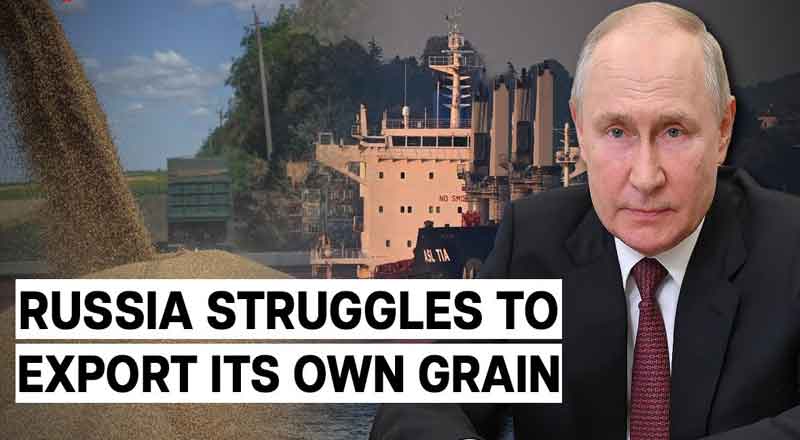- Russian turning to “shadow fleet” to move its grain, sources say
- Major global grain traders reduce activity in Russia
- Russia aiming to export volumes of wheat near record highs
- Russian-operated fleet of grain ships well below needs
Russia’s lack of ships and Western grain traders’ shrinking appetite for business with Moscow are adding to the rising costs of moving Russian wheat, at a time when the war in Ukraine has spilled perilously close to vital Black Sea supply routes.
President Vladimir Putin promised to replace Ukrainian grain with Russian shipments to Africa after Moscow in July ended an arrangement that gave Ukraine’s food cargo safe passage in the Black Sea, imposing a de-facto blockade on its neighbor and attacking storage facilities, in an escalation of the war.
Ukraine’s response, sea-drone attacks on a Russian oil tanker and a warship at its Novorossiysk naval base, next door to a major grain and oil port, has added to these new dangers for transport in the Black Sea.
Even though agriculture exports are not subject to direct European and U.S. sanctions imposed after Russia invaded Ukraine last year, Moscow says restrictions placed on banking and Russian individuals are “hidden sanctions” on the food trade.
The financial and security risks associated with trading with Russia – compounded by the Black Sea corridor collapse – are driving up costs of freight for Moscow and pushing it toward older and smaller vessels run by less established shipping operators, Reuters reporting based on conversations with 10 marine insurers, traders and shipping companies showed.
The situation is raising doubts about whether Russia can keep up a record pace of exports and if not resolved could push global wheat prices higher, the sources said. Already, prior to the expiry of the deal, grain carriers and commodity houses had reduced exposure to Russia.
Global commodity houses are no longer helping Russia with the mechanics of trading its grain. Cargill, Louis Dreyfus, and Viterra stopped such work on July 1, adding more pressure on Moscow to handle all aspects of grain deals including transport.
Last year, Russia exported a record volume of wheat on ships chartered by international companies and traders. While exports remain strong, in the past few months it has had to source more of its own freight, increasingly relying on a “shadow fleet” of older vessels typically operated by companies based in Turkey and China, three shipping industry sources said.
Denmark’s NORDEN and two other Western shipping groups that declined to be named told the news agency that they stopped working with Russia after the invasion of Ukraine in February 2022.
Without the Black Sea corridor in place, both Russia and Ukraine warned in July that ships destined for each other’s ports could be treated as legitimate military targets, which three marine insurance sources said was a further blow to Western companies’ risk appetite.
Despite the tensions, global wheat prices remain well below the peak after Russia’s invasion last year triggered fears of a global hunger crisis. The removal of more Ukrainian grain from the world market could add to supply pressure unless Russian exports or large crops from other producers make up the difference.
In a statement to a news agency, Russia’s agriculture ministry forecast grain exports will fall about 8% during the 2023/24 season from Russian last year’s high of 60 million tonnes. It did not give a reason for the drop.
(With inputs from agencies)





